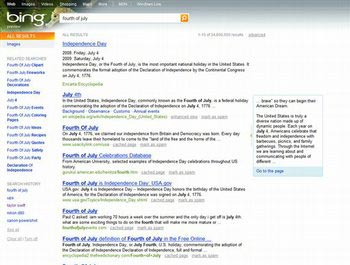
|  |  |  Technology News | May 2009 Technology News | May 2009  
Cuba Criticizes Microsoft Blocking Messenger
 Andrea Rodriguez - Associated Press Andrea Rodriguez - Associated Press
go to original


| | In this image provided by Microsoft Corp., a screen shot of the Bing search engine is shown. Microsoft is rolling out the redesigned search site in the coming days and hopes it will lure more Web surfers than the two most recent incarnations, Live Search and MSN Search. (AP/Microsoft Corp.) |  |
Havana — Cuba criticized Microsoft on Friday for blocking its Messenger instant messaging service on the island and in other countries under U.S. sanctions, calling it yet another example of Washington's "harsh" treatment of Havana.

The technology giant recently announced it was disabling the program's availability in Cuba, Syria, Iran, Sudan and North Korea to come into compliance with a U.S. ban on transfer of licensed software to embargoed countries.

The move "is just the latest turn of the screw in the United States' technological blockade against the island," a technology writer said in an article published by state youth newspaper Juventud Rebelde.

He called the ban on transfer of technology "a truly harsh violation" of Cuba's rights.

Messenger has been used on the island for a decade without Microsoft interference.

Dharmesh Mehta, director of Windows Live Product Management at the Redmond, Washington-based company, said Microsoft "made the change late last year in connection with the last product release of Windows Live Messenger."

"This is not a new change, but has only recently received attention," he said.

He added that "Microsoft is one of several major Internet companies that have taken steps aimed at meeting their obligations to not do business with markets on the U.S. sanctions list."

Mehta said that "Microsoft supports efforts to ensure that the Internet remains a platform for open, diverse and unimpeded content and commerce," and that "governments should exercise restraint in regulating the Internet."

Internet communications service Skype currently works in Cuba, but the government evidently has periodically blocked other similar services in the past – sometimes including Messenger.

Last month, the Obama administration announced it was lifting some U.S. restrictions on telecommunications with Cuba in an effort toward easing the island's isolation. It is unclear if those changes will affect the ban on export of licensed software.

Cuba has been criticized for its own restrictions on Internet technology.

Although many islanders have access to e-mail through schools, workplaces and post offices, government restrictions keep most citizens from unfettered access to the Web. Officials say the island does not have enough bandwidth to allow universal access.

Cuba's Internet connection comes via satellite from faraway countries such as Italy and Canada, and Havana complains that the U.S. embargo prevents it from obtaining better service through underwater cable.

The government uses filters on the islandwide intranet to block pages that contain pornography or are considered a threat to national security, including some sites run by anti-communist exiles, the U.S. government's Radio Marti and popular Cuban blogger Yoani Sanchez's "Generation Y."

Despite restrictions on U.S. licensed software, the Cuban government employs Windows operating systems and other Microsoft programs on many of its computers. But it is working toward replacing them with open-source programs.

During a media tour of Raul Cepero Bonilla technology high school in the capital, students and teachers this week touted the benefits of open-source software.

"Open software is comfortable, free, easy to modify and public," 15-year-old student Anette Camacho said.

Teacher Alain Tourino said Cuba should use only open software so it isn't bound to the rules and decisions of U.S. technology companies.

AP Technology Writer Jessica Mintz in Seattle contributed to this report. |

 |
|  |



